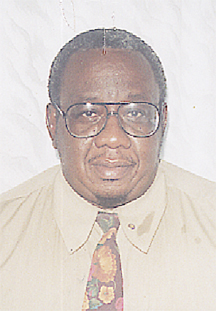The Guyana Manufacturing and Services Association (GMSA) last week announced the less than surprising re-election of Guyana National Industrial Corporation (GNIC) Chief Executive Officer Clinton Williams to the presidency of the Guyana Manufacturing and Services Association. (GMSA)
Williams returns to the presidency of the local manufacturing umbrella body having been compelled by its rules to sit out one term after serving two successive terms beginning in June 2010.

The interregnum between the end of Williams’ second term and his recent re-election was filled by Mohindra Chand, an official of Barama Company Ltd with little known experience in leading an umbrella business organisation. Little of significance happened under Chand’s watch though he can hardly be blamed for the crisis in the sector, all of which preceded his accession to office. It came as little surprise that he did not seek re-election.
Long before Chand took office in what was regarded as no more than a stop-gap arrangement, stakeholders in the manufacturing sector had begun to level criticism at the GMSA for what was felt to be its failure to effectively pressure government into easing constraints to reviving the industry; constraints like unreliable and costly electricity supply and the high cost of imported raw materials and limited market access, among others.
Earlier this year the GMSA alluded to its focus on supplying the needs of micro, small and medium-sized entrepreneurs and ensuring their expansion and enhanced streams through affiliations with international agencies including the Trade Facilitation Office of Canada and the Canadian Executive Services Overseas as being part of the raison d’etre of the association. At this juncture, the GMSA would do well to reflect on whether or not its goals of “grooming in-plant efficiency and product-line expansion” in the manufacturing sector has been realised.
Another largely unmet part of the GMSA’s mandate has been providing effective advocacy to ensure the enforcement of official commercial regulations involving the import and exportation of goods and materials, the rights and conditions of access through the nation’s roads and waterways, procedures for investments, setting up new businesses, and for reductions or changes to existing costs and charges that have negative impacts on overhead expenditures across the board. Again, the GMSA may wish to reflect on the extent to which its mandate in those respects has been effectively carried out.
By its own admission the GMSA “has encountered a measure of membership apathy” though, quizzically, the association attributes this development to likely “cross-membership” pressures associated with paying dues and subscriptions to two or three business service organisations. Interestingly, the association does not appear to lose sight of member concerns over “their own negative experiences with certain regulatory bodies which remain unresolved” and which those members perceive as a failure on the part of the association.” What the GMSA and the various other business service organisations are disinclined to acknowledge is that room to advocate for better conditions for the manufacturing sector is very limited, blocked by a political administration that has, time and again, taken unkindly to private sector criticism. That, in the main, is what stakeholders have told this newspaper. They may be somewhat sympathetic to the clashing rocks between which the leadership of the GMSA often finds itself. Criticism of state policies is not often the best of ideas.
Williams, a considerably more experienced operator than his predecessor, returns to the presidency of the GMSA to face a largely unchanged list of problems including high production costs, limited regional and extra-regional market opportunities, a lack of financial resources in most of the manufacturing sub-sectors for investment in plant and machinery upgrading and expansion and high taxes and duties on some imports. Beyond those challenges there are the more recent ones like barriers to the export of locally manufactured goods that include required higher standards of packaging and labelling.
During Williams’ current term in office the GMSA will also have to grapple with the formidable challenge of steering local manufacturers towards meeting the requirements of the United States Food Modernization Act, probably the most sweeping reform of the country’s food safety by-laws in more than half a century. The cost of meeting those requirements are almost certainly beyond the reach of most local food manufacturers, but failure to meet them will lead to exclusion from the US market.
Williams will also quickly discover that while local manufacturing micro-businesses in the craft and garment-producing sectors may have come to terms with the presence of Chinese competition, the resentment over what locals
perceive to an unfair advantage enjoyed by the Chinese including cheaper goods and more capital for investment in business structures – concerns remain as strong as ever and could spill over into periodic criticism of the GMSA.
The re-elected GMSA President will also doubtless recall Guyana’s participation in the 2011 high-level Caribbean-China Trade Forum in Port of Spain which promised much but, up to this time, appears to have yielded little for Guyanese businesses.
How to provide more effective representation for small businesses by offering them with membership of major umbrella organisations is not an issue that appeared to appeal to the local umbrella business bodies until the Georgetown Chamber of Commerce and Industry (GCCI) ‘belled the cat’ very recently. Even then, it did not go down well with all of the chambers members. The GMSA though, may fare better in embracing the host of small businesses not involved in manufacturing.
How much change the new administration will bring to the GMSA and to the manufacturing sector as a whole is unclear at this stage. The organisation’s Board of Directors may contain considerable private sector management experience including Swansea Chairman Clem Duncan, DDL’s Chandradat Chintamani and, Banks DIH’s Ramesh Dookhoo, Williams’ predecessor at the end of his first two terms. There is, however, a look of sameness to the board which suggests that major changes in direction should not be anticipated.




